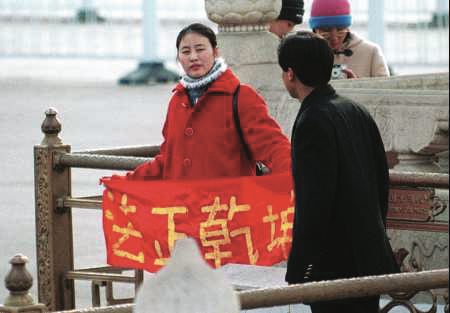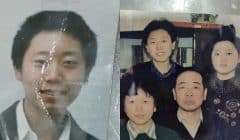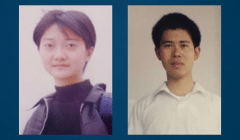The Rise and Resilience of Falun Gong

A woman joins Falun Gong practitioners holding a candlelight vigil at the Lincoln Memorial in Washington D.C., on July 20, 2017, to honor those who have died during the persecution in China that the Chinese regime started on July 20, 1999. (Benjamin Chasteen)
Try as the Chinese Communist Party did to obliterate ancient Chinese spiritual practices in order to establish class struggle and atheism as the new Chinese culture, the Party could not remove traditional spiritual beliefs from people’s hearts.
Rather than returning to traditional modes of religious expression, Chinese spiritual teachers began repackaging ancient philosophy into innocuous, secular-sounding exercises generically called “qigong” (literally “energy work”). These practices touted longevity, better energy, improved health, and the like. Soon, hundreds of qigong teachers could be found interacting with a public hungry for the traditional Chinese techniques. Each morning, Chinese of all ages flocked to public parks to practice various forms of these tai chi-like exercises.
Based on the ancient meditation and cultivation systems of the Buddha and Dao schools, these practices fulfilled a deep need for rediscovering Chinese identity after decades of cultural upheaval, but the qigong craze also opened the door to enterprising, self-styled gurus. Some claimed that by becoming an exclusive member of their school, their followers would develop superpowers—mind reading, levitation, the ability to disappear—or that they could release healing energy, enabling them to become qigong masters over the course of a three-day workshop.
Under the guise of popular culture, the Chinese were able to explore the spiritual. Many enthusiasts tried dozens of types of qigong, most out of mere curiosity, but many genuinely hoped to find something that resonated and that could satisfy a deeper spiritual yearning.
Authentic Chinese Culture Revived
While many teachers vied for followers, one came on the scene that caused all of China to take notice. Born in the northeastern town of Changchun, Mr. Li Hongzhi had studied under Buddhist and Daoist masters in his youth. In 1992, Mr. Li began lecturing across the country, making traditional cultivation methods accessible to the general public through an ancient qigong method called Falun Gong, also known as Falun Dafa. His talks were unlike those of other qigong teachers because of his focus on moral standards and self-improvement.
His talks were unlike those of other qigong teachers because of his focus on moral standards and self-improvement.
Falun Gong teaches the principles of truthfulness, compassion and forbearance. It emphasizes character-building and virtue—rather than supernormal powers—as the true path to health and spiritual elevation. Mr. Li charged only small entrance fees to cover the costs of traveling and venue rentals. Though he never advertised his lectures, they had the greatest turnout. The health benefits of the practice quickly spread by word of mouth alone, and eventually attracted thousands at a time.
By 1999, according to China’s official estimates, 70 million to 100 million people were studying Falun Gong, not counting the many more who had casually practiced it for a short time. This amounted to approximately 1 in every 13 people in China. In many cases, entire families across generations took up the practice after seeing the positive changes it engendered among their friends and relatives. Virtually everyone knew someone who practiced Falun Gong.

The practice became so popular that in public parks every morning, hundreds of people could be seen performing Falun Gong’s meditative exercises to peaceful music before heading off to work. While morning group qigong exercise is a common sight in China’s public squares, the sheer volume of attendees at Falun Gong practice sites was unusual. Volunteers provided the exercise instruction free of charge to anyone who wanted to learn. When one exercise site became too large, practitioners would volunteer to start new ones at other locations.
Many people were initially drawn to Falun Gong because of its healing effects. However, a significant reason for Falun Gong’s popular appeal was also due to its simple and straightforward requirements for practitioners: Live your life according to truthfulness, compassion, and forbearance, let go of negative attachments, and be responsible to yourself and others. Mr. Li discouraged the fanaticism that practitioners of other qigong schools so often dedicated to their masters, and instead encouraged Falun Gong practitioners to focus on what matters—becoming a better person.
The Chinese people recognized in Falun Gong’s teachings the core tenets shared by Buddhism and Daoism. But unlike these religions, there were no ordinances, onerous lifestyle restrictions, or the requirement to relinquish the secular world. Falun Gong spelled out the essence of cultivation and avoided the esoteric language of ancient scripture.
The Chinese public quickly recognized Falun Gong as a truly useful set of principles for living a meaningful life. This attracted people from all backgrounds and strata of society, including barely literate farmers, university professors, homemakers, and communist cadres. The common sentiment among Chinese people upon encountering Falun Gong, whether they chose to practice it or not, was that the true heritage of China had been revived. As retired Chinese official Mr. Hao Ye tells it, “People really took it to heart. In Falun Gong, we believe the true ancient, good things have come back!”
A Medical Marvel
Falun Gong taught that only with elevation of thought and behavior could true and lasting health follow. And so it was. A 1998 survey of 6,000 practitioners in Dalian City showed a near-complete recovery rate among those with diseases. So did similar studies in other Chinese cities and in Russia. Even chronic and terminal patients—such as those with cancer, immunological diseases, and neurological problems—showed marked or complete recovery by practicing Falun Gong, and without the help of medical intervention.
A study in 2016 by an Australian researcher found that Falun Gong practitioners reported fewer health problems, improved mood, and much lower drug and alcohol use compared to others. These cases demonstrated that the practice worked on the individual’s holistic health—emotional, mental, and physical.
In a Feb. 22, 1999, interview with U.S. News & World Report, an official from China’s State Sports Commission praised the practice for reducing the state’s medical costs: “Falun Gong and other types of qigong can save each person 1,000 yuan in annual medical fees. If 100 million people are practicing it, that’s 100 billion yuan saved per year in medical fees.” The official said that then-Premier Zhu Rongji was very happy about this.
Communist Tyranny Rears Its ugly Head
Unfortunately, Falun Gong’s good reputation drew attention from hardliners within the Communist Party. As early as 1996, the publication of Falun Gong’s main book, Zhuan Falun, was banned by government censors. Communist Party ideologues look askance at faith groups in general. They disapprove of Falun Gong in particular because of its immense popularity and because it has sparked a desire among the public for the traditional culture, including belief in the divine, which the Party has tried for decades to eradicate.
Jiang Zemin, a Shanghai bureaucrat, was chosen to lead the CCP in 1989 after he actively supported the Tiananmen Square assault on students by shutting down protests and a major newspaper in his jurisdiction. He was fearful of anything outside his control that could win the people’s hearts. A decade later, Jiang became jealous seeing that so many people admired Mr. Li, and decided that the practice had to be annihilated. A November 1999 Washington Post article about the repression of Falun Gong reported that Jiang’s “resolve was only strengthened when he learned people close to him were followers of the group.”
In the summer of 1999, Jiang acted independently of the People’s Congress and launched a campaign to eradicate the practice. According to The Washington Post’s 1999 article, Communist Party sources said that the Standing Committee of the Politburo did not unanimously endorse the repression of Falun Gong, and that Jiang alone decided to instigate it.
In June 1999, Jiang established the 6-10 Office (China’s version of the Gestapo) to kidnap and extrajudicially incarcerate practitioners en masse. In true dictator fashion, he announced his goal of “defaming their reputations, bankrupting them financially, and destroying them physically.” Meanwhile, the entire state-controlled media apparatus dutifully went into overdrive to justify Jiang’s genocidal campaign. The defamation, financial deprivation, and killing has continued ever since.
Back to the Dark Ages of China’s Cultural Revolution
One of the most powerful weapons in the communist arsenal is public opinion. In the late 1990s, China’s state-run media outlets were tasked with changing the public’s opinion of Falun Gong. With over 70 million people practicing Falun Gong, many Chinese had heard a first- or second-hand account of its benefits, and they certainly had heard about the practice in glowing terms through state-run media itself.
To pull off this about-face, in July 1999, the CCP launched what can only be described as “propaganda marathons” throughout the country. State-run television piped vilifying propaganda into homes throughout the nation and around the clock, branding Falun Gong a menace to society. Merely seven days into the campaign, authorities boasted of having confiscated more than 2 million “illegal” Falun Gong books. Some cities even witnessed book-burning rallies, which were carried out by the Public Security Bureau. By the end of the campaign’s first month, the People’s Daily, the voice of the Party, had carried a staggering 347 articles denouncing Falun Gong.
The extent of the pressure exerted on society is hard for those in the West to imagine. Schoolchildren were forced to study hateful fabrications in textbooks; college entrance exams contained questions criticizing Falun Gong; workplaces held mandatory “study sessions” on the topic. And of course, everywhere people went, they were surrounded by the constant barrage of propaganda. The residual effects have remained instilled in many Chinese minds to this day.
Despite the CCP’s best efforts, by the middle of 2000—a full year after the persecution campaign started—many throughout the country who knew Falun Gong was a positive, healthy practice remained unconvinced or at least unmoved. But that began to change radically in early 2001 when the Chinese regime staged an event that would turn the tide against Falun Gong.
On Jan. 23, 2001, five individuals allegedly set themselves on fire in Beijing’s Tiananmen Square. The entire scene was caught on camera from multiple angles. How TV crews for state-run media knew exactly where to place their cameras just before the “impromptu protest” is highly suspect. Within hours, state-controlled media inundated the public with false reports that the “self-immolators” were Falun Gong practitioners. These reports included grisly footage of the victims and portrayed Falun Gong teachings as directly responsible for the tragedy. In fact, Falun Gong’s teachings strictly forbid killing, including suicide. Falun Gong practitioners throughout China and abroad rejected the alleged act as something that sincere followers would never do.
In the weeks following the event, a wealth of evidence was uncovered that indicated the entire incident was staged by the CCP. The Washington Post published an investigation of two of the “self-immolators” that found that they had never practiced Falun Gong. Yet, people inside China had no access to this information, and the Chinese state-run media continued a blitz campaign to portray the “self-immolators” as Falun Gong practitioners.
The grisly nature of these reports and the frequency with which they were broadcasted began to have its effect. People across China changed from respecting and sympathizing with Falun Gong to rejecting and attacking the practice. Members of the public who had remained unconvinced by the months of endless propaganda vilifying Falun Gong finally came around to the Party line. Hostilities against practitioners increased, and the CCP escalated its persecution with intensified arrests, torture, killing, and forced organ harvesting.
Rampant Torture and Abuse
The climate of fear and paranoia facilitated by the self-immolation reports paved the way for the Party to pull a page from the communist revolutionary playbook—utilizing psychiatric facilities to break their enemies. Healthy people who practiced Falun Gong were deemed insane if they did not keel under the pressure to stop practicing—because who in their right mind would continue following a faith that the whole society had “agreed” is harmful?
Thus, practitioners were forcibly administered psychotropic drugs and other dangerous treatments to cure them of their supposed delusion. The authorities took the behavioral effects of these substances as further evidence that the practice produced psychosis, and the cycle of needless torment continued. Brainwashing centers pumped visual and audio propaganda into the minds of practitioners for days on end until they could no longer tell their own thoughts from those manufactured by the state.
A 2002 paper published in The Journal of the American Academy of Psychiatry and the Law noted: “At least 57 hospitals in 36 cities are known to be involved in the illegal detention of [Falun Gong] practitioners, with some of them located in major cities, such as Beijing, Shanghai, Nanjing, Guangzhou, Hangzhou, and Wuhan. At least six of the 320 documented deaths caused by official mistreatment have been the result of abuse of psychiatric treatment.” As the years went by and the tools of persecution became more sophisticated, the numbers of such facilities grew.
Abusing the medical system to torture Chinese citizens was only one part of a multi-pronged persecution. For the past 20 years, practitioners and their families have been under constant surveillance. Phones are tapped and computers traced. Having plainclothes policemen surveil their every move remains a common experience for many practitioners in China. Some live in a constant state of unofficial house arrest.
Those unfortunate enough to be captured often end up in labor camps, where in addition to 18-hour shifts of manual labor, they have to endure torture techniques such as shocking with electric batons, burning with irons, tying the body in painful positions for days, force-feeding saline solutions or human waste through a plastic tube inserted in the nose, and prying out fingernails with bamboo pieces.

To date, over 4,000 deaths have been confirmed by overseas human rights workers, although the actual toll is many times higher. Hundreds of thousands of accounts of torture or abuse in custody have been documented. Millions have been abducted and held in labor camps, prisons, makeshift detention centers, or “black jails” (a network of extralegal detention centers where individuals are held without trial).
This all-encompassing campaign of persecution is not targeting a tiny, marginal group. Tens of millions of people across all of China and from all walks of life are the target, and that’s not including their family members who have to endure the reality that their loved ones could be abducted by local officials at any time.
This persecution has swept up the entire nation, a nation where, at one point, everyone knew someone who practiced Falun Gong. Today, every Chinese citizen is either a target, a perpetrator, a discreet protector, or a silent enabler. Some have been many of these over the course of the last 20 years. Virtually no one has been left completely unaffected.
As human rights lawyer David Matas explains, it’s only after this entire picture is realized—the normalized brutality, the sheer volume of Falun Gong practitioners imprisoned, their dehumanization, plus China’s long-standing and public practice of removing organs from convicted felons on death row—that forced organ harvesting of these innocent people becomes believable. For us in the West, genocide through forced organ harvesting seems impossible. In China, however, all the necessary groundwork has been laid.
Doctors of Death
The first major reports of organs being harvested from imprisoned Falun Gong practitioners emerged in 2006. In a few short years, Falun Gong practitioners had gone from accepted and respected members of society to becoming its reviled underclass. Then it was revealed that their bodies were being sold for parts.
China has no cultural tradition of organ donation, nor a voluntary donation system. Since the 1980s, China has officially admitted to extracting organs from executed prisoners convicted of capital crimes. Suddenly, Chinese hospitals were advertising short wait times for livers and lungs, but with no corresponding increase in executed criminals, which begs the question: where did all these organs come from? Many people, particularly desperate transplant patients, didn’t think too much of it and flew to China for speedy surgeries.

Former Canadian Secretary of State (Asia-Pacific) David Kilgour and Matas looked into China’s booming transplant industry and discovered substantial evidence of China’s killing machinery. Unlike illicit organ trades in other countries, these organs didn’t come from the desperate poor willing to trade a kidney for cash, nor from unsuspecting individuals kidnapped by gangs. In China’s case, the butchery was state-sanctioned, and the illicit market was China’s transplant industry itself.
Joined by Ethan Gutmann, Kilgour and Matas released an update to their research in 2016. Bloody Harvest / The Slaughter: An Update details the types and locations of the transplant centers, the volume, organ type, frequency of transplants, and sources of the organs. Numerous documentaries have been produced in the past decade showing that the short wait times and organ availability advertised to medical tourists meant that the organs couldn’t have any other possible source—prisoners were being killed on demand.
Furthermore, eyewitnesses have come forth to tell what they’ve seen, or what they’ve had to do, in hospitals where they worked. Falun Gong practitioners who have been released from the prison system tell of routine blood typing and unexplained medical exams. Doctors have since confirmed that these sorts of tests are necessary to find out whether a detainee could be a match for a transplant patient.
As always, where the Mengele of China went, its Goebbels followed.
TV anchors continue to tout China’s state-of-the-art transplant technologies as a point of national pride. Chinese hospitals and their affiliates overseas advertise their short wait times for organs worldwide. Top medical officials in the Communist Party go on public relations tours to whitewash China’s transplant practices and to make hollow promises of ethical improvement.
Many are not buying it.
Over the past two years, more and more states across America have passed resolutions condemning China’s forced organ harvesting of Falun Gong practitioners. Israel ruled that its health insurance system could not fund transplants in China for Israeli nationals and made it a crime to receive trafficked organs. Spain now has a 12-year prison sentence for anyone who promotes or facilitates organ trafficking. Australia is currently working on legislation to make organ transplant tourism illegal.
In 2018, an independent people’s tribunal was established to inquire into forced organ harvesting from prisoners of conscience in China. Survivors stepped forward to tell their stories before the jury in London, and consequently the tribunal issued an interim verdict stating that it was convinced beyond a reasonable doubt that forced organ harvesting was taking place.
Today, 40 members of the U.K. Parliament support banning transplant tourism to China. In addition, medical review boards vet white papers submitted by Chinese transplant surgeons who may have conducted their research on non-consenting donors.
Awakening China’s Conscience
From the very first days of the persecution, Falun Gong practitioners have believed that the key to a peaceful resolution rests with the Chinese people themselves. After all, it has been people who carry out the day-to-day suppression—the small-town police departments and labor-camp administrators, the school teachers forced to turn in unrepentant Falun Gong students, the neighbors who report on neighbors. Falun Gong practitioners reason that if the people knew the truth, they would no longer be complicit in such injustice.
Beginning in 2001 and continuing to this day, Falun Gong practitioners have set up underground printing houses in nearly every county and district in the country—China’s equivalent of the Soviet samizdat. From their living rooms, practitioners have established secure internet connections, accessed websites outside China by using proxy servers, downloaded censored literature on the persecution of Falun Gong, and used it to produce homemade leaflets.
Others volunteer to distribute the literature, usually by night. These actions are always taken at great risk. Untold thousands have been arrested and many killed for possessing and distributing these materials or for operating the production sites.
The future of the world’s most populous nation lies in how it answers the Falun Gong question.
Abundant evidence of these underground printing houses comes from a multitude of sources: from official statistics on police seizures of Falun Gong informational material to anecdotal accounts of citizens regularly waking up to find CDs or leaflets about the persecution waiting outside their front door. Chinese government and Communist Party websites routinely report on efforts to limit the circulation of Falun Gong-related literature.
In the spring of 2009, for instance, the Fujian Provincial Transport Administration issued a notice ordering that among the items to be targeted as part of a nationwide crackdown on illegal publications were those that “slandered the country’s political system, distorted the history of the Party, … [or] publicized Falun Gong.”
Today, 200,000 or more of these underground printing houses continue to operate across China in what likely constitutes the largest non-violent, grassroots resistance in the world.
In addition to quietly distributing literature under cover of darkness or among close friends and acquaintances, some Falun Gong adherents have also been known to go door-to-door to tell their stories to common citizens. Their goal is to improve understanding of a persecuted faith, and the stakes are incredibly high.

In recent years, scores of human rights lawyers have risked their careers and their own freedom in order to speak out against the injustice done to Falun Gong practitioners. Perhaps the most prominent among them is Mr. Gao Zhisheng. Featured on the cover of The New York Times in 2005 and later nominated for the Nobel Peace Prize, Gao began taking Falun Gong cases in 2005 after conducting his own investigation of the persecution. “The cruel nationwide persecution of Falun Gong believers has seen no precedent,” Mr. Gao would later write, “both in terms of the number of people unlawfully detained and killed, and in terms of the degree of brutality.”
In more recent years, attorneys such as Mr. Quanzhang Wang and Mr. Yanyi Xie were actively defending Falun Gong in Chinese courts. However, many lawyers, including Mr. Wang and Mr. Xie, were arrested in 2015 in what has become the “709 incident”— a large-scale arrest of human rights lawyers in July 2015. Mr. Wang was sentenced to four years in prison, although his whereabouts are unknown. Mr. Xie was detained for 18 months and tortured.
Meanwhile, hundreds of thousands of Chinese people who do not practice Falun Gong have sent declarations to the overseas Minghui.org website publicly apologizing for past participation in anti-Falun Gong activities. Many have expressed their gratitude toward Falun Gong’s founder, Mr. Li, and also to practitioners for their kindness, courage, and patience in awakening the goodness in people’s hearts.
This growing chorus of voices from China is bolstered by increasing concern about the persecution in the West. The U.S. Congress has passed five resolutions commending Falun Gong’s peaceful nature, condemning the persecution, and calling on China to end it. Human rights organizations like Amnesty International, Human Rights Watch, and Freedom House have issued dozens of reports, documenting cases of wrongful imprisonment, torture, and deaths in custody.
In many ways, the pain endured by the Chinese nation over the course of communist rule has culminated in this showdown between the CCP and Falun Gong—a tyrannical regime versus peaceful spiritual practitioners who do not strike back and refuse to give in. Left unchallenged, the Chinese regime will only widen its use of torture and surveillance to include more and more of its citizens. We have already begun to see this happen in the recent reports of Uyghur concentration camps and a digital “social credit” system to monitor the behavior of the masses.
In the face of this persecution, each Chinese person has a choice—to continue to cower and suffer a hampered existence under an unjust regime, or to renounce communism and begin reclaiming the true Chinese culture. In short, the future of the world’s most populous nation lies in how it answers the Falun Gong question.









